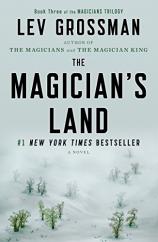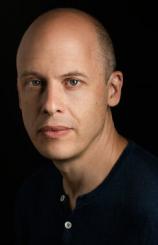The Magician's Land
Review
The Magician's Land
“Don’t cry because it’s over, smile because it happened.” Attributed (almost certainly erroneously) to Dr. Seuss, that thought sums up my feelings as I turned the last page of THE MAGICIAN’S LAND, the gorgeous final novel in Lev Grossman’s enthralling trilogy about a group of young magicians, their transition into adulthood, and the magical world that exerts an irresistible pull on their lives. “I wanted to see what happens when you take techniques and tropes from literary fiction and transport them, illegally, across genre lines,” Grossman said in a recent interview. Both in this novel and in the arc of this series, he has managed to accomplish that feat with impressive style.
When the THE MAGICIAN’S LAND opens, it’s been seven years since Quentin Coldwater, now age 30, was deposed from the throne of Fillory, the not-so-mythical land whose tales had been a source of fascination to him since childhood. In the real world, he has hit rock bottom. Bounced from a teaching position at Brakebills College for Magical Pedagogy, he is now “just another striver, grim and desperate.” Along with a handful of other misfit magicians, he is recruited to retrieve a mysterious suitcase and promised $2 million in cash or gold if the caper succeeds.
"It’s clearly too early to predict that Grossman’s trilogy someday will be mentioned in the same breath as the works of C.S. Lewis or J. K. Rowling. But with these more than 1,100 pages of frequently thrilling, emotionally mature and ultimately magnificent fantasy, he at least has staked a serious claim to be considered for inclusion in their beloved company."
Things aren’t much better in Fillory. Quentin’s friends, Eliot and Janet, the High King and Queen, are warned that “Fillory is dying,” but they’re powerless to arrest its rapidly accelerating decay as they watch the sun “spending its remaining thermal and kinetic energy on destroying itself and throwing stupendous curling gouts and ferns of fire in the air and erecting a vast pillar of steam reaching up to the sky.”
Beyond this scene setting, there’s little point in attempting to summarize the sturdily constructed, if sinuous, path of the novel’s plot. As skilled as he is in portraying the full-bodied characters that inhabit a literary novel, Grossman is determined, above all, to tell a good story. Though the book at times is a heartstopping thrill ride, even in its most pensive moments, its momentum never flags. Grossman adds texture and pathos to the Fillory backstory, offering an excerpt from a touching memoir written by Rupert Chatwin, one of the five English children whose adventures in that land turn out to be more real, and more heartbreaking, than revealed in the previous installments.
The theme of rescue permeates THE MAGICIAN’S LAND. Quentin invokes powerful and dangerous magic attempting to restore to life his girlfriend Alice, turned into a wraithlike creature called a niffin in THE MAGICIANS. Quentin and his compatriots are enlisted in another rescue mission --- the one to save Fillory from the entropy that threatens to destroy it. And through all these perilous adventures, Quentin, a lifetime removed from the sullen 17-year-old transported to the magical realm of Brakebills and now a world-weary adult, continues to learn how tough it is to make one’s way in the world, real or magical. Grossman’s patient development of this character is one of his most impressive accomplishments.
Whether the setting is the Newark Liberty International Airport Marriott, where Quentin and the rest of the motley band that includes a young woman, Plum, who’s a descendant of the Chatwin family, await instructions from a talking blackbird on the next step of their mission, or the gorgeous, fantastic land of Fillory, Grossman’s story works because it never loses its grounding in a tangible reality. He has also retained his gift for wry contemporary references that are clever but not intrusive. “Supposedly the whole electoral debacle of 2000 was mostly a shoving match between two magicians who were trying to settle a bet,” Quentin reflects, in one such example.
Like the deftest magician, Grossman is in complete command of his bag of narrative tricks. That’s demonstrated in vivid scenes like his account of the life-and-death battle that ensues when Quentin and his comrades try to seize the mysterious suitcase, or when, as in this passage, he describes the Armaggedon-like clash that seems to herald the death of Fillory: “The chaos itself was momentarily, unfairly beautiful. The thrashing sun, the spinning, looping, moon, Fillory half light and half shadow, dotted with flashes of fire, lava and flame and magical strikes from magical beings. Ignorant armies clashing by night.”
As much as these novels deal with the lure of magic with its “wild feelings, the kind that escaped out of you and into the world and changed things,” at their core they are a tribute to the magical power of books, especially those we encounter when we’re young, to transform our lives. “Magic and books: there aren’t many things more important than that,” says Quentin, in a wistful library scene. It’s clearly too early to predict that Grossman’s trilogy someday will be mentioned in the same breath as the works of C.S. Lewis or J. K. Rowling. But with these more than 1,100 pages of frequently thrilling, emotionally mature and ultimately magnificent fantasy, he at least has staked a serious claim to be considered for inclusion in their beloved company.
Reviewed by Harvey Freedenberg on August 15, 2014





